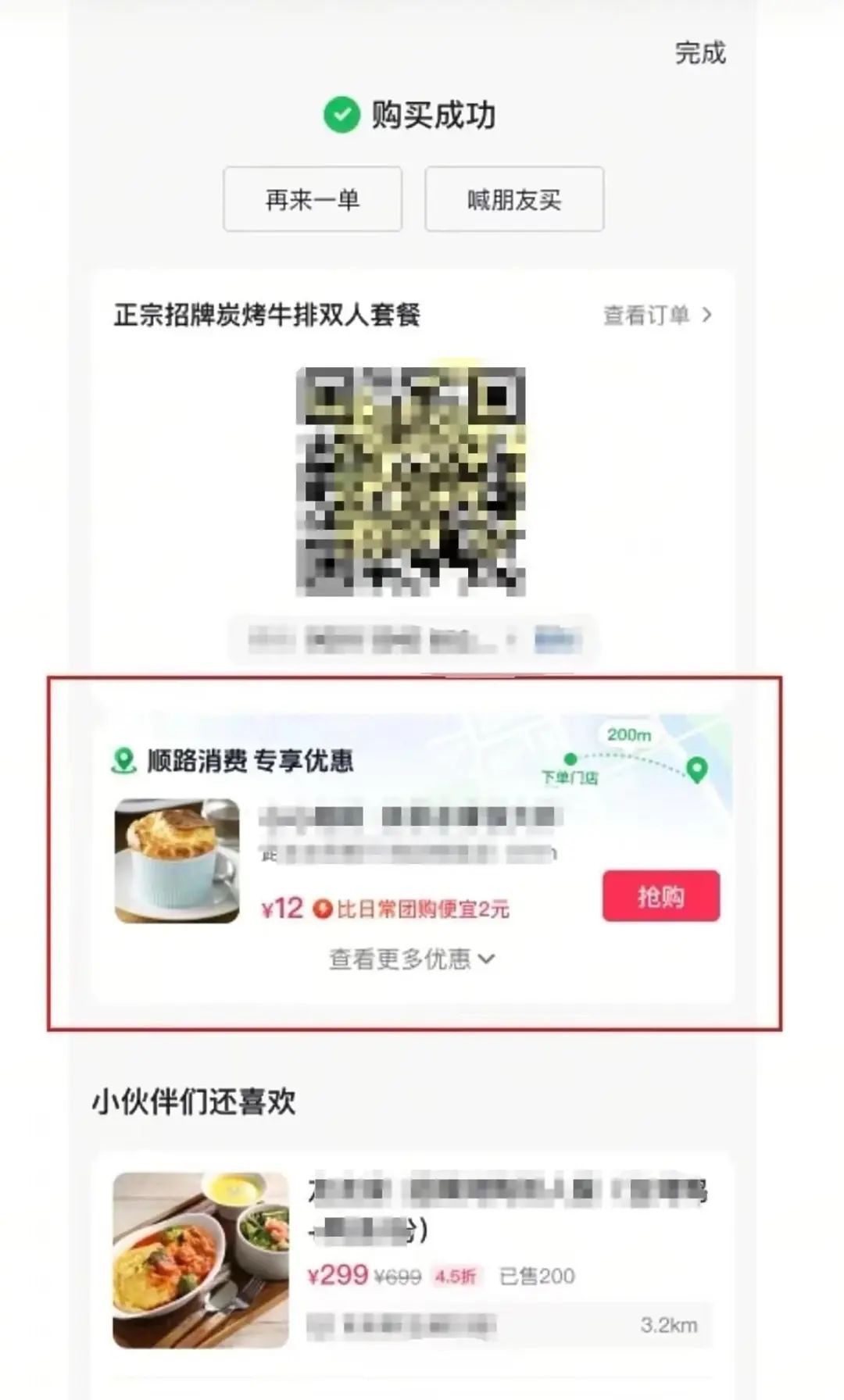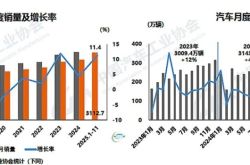Douyin Tests "Convenient Price" for Group Purchases, Seeking Differentiated Competition with Meituan?
![]() 07/24 2024
07/24 2024
![]() 461
461

According to Sina Finance, insiders at Douyin confirmed that the platform is testing a "Convenient Price" feature. After users successfully pay for a group purchase order, the order page will push other group purchase items within a 1-kilometer radius that are priced lower, focusing on convenient consumption.
The inspiration for this feature likely comes from e-commerce platforms' "convenient purchase" option, which often recommends a related and low-priced item on the page after the user successfully places an order, providing a high-probability traffic channel for direct payments for many merchants.
Douyin's "Convenient Price" differs from the existing "Friends Also Like" recommendation feature on the successful group purchase order page, which aims to recommend multiple packages at similar prices and specifications. Instead, "Convenient Price" provides a traffic entry point for merchants with lower per-customer prices or smaller operation scales, making up for the shortcomings of Douyin's broad traffic characteristics in its content ecosystem.
Additionally, "Convenient Price" items are likely to be only one or a few items, with the greatest significance being to help users save decision-making costs and let consumers know that this is the most suitable convenient combination calculated by the system algorithm.
Some media outlets see this feature as another attack by Douyin on Meituan's on-site business. However, as mentioned in a previous article by "New Standpoint" titled "Meituan 2023: Defending On-site, Advancing into Fresh Food," Meituan and Douyin have gradually differentiated into different models in on-site services, with both essentially dividing up different operational links for on-site and travel merchants.
Therefore, New Standpoint believes that Douyin's apparent "convenient" feature test is more significant in attempting to complement the logic of on-site services across internet platforms.
01. Can "Convenient Price" Leverage New User Mindsets?
Douyin's biggest assets in local life are content and algorithms, which give it an advantage in competing with Meituan but also bring disadvantages of centralized traffic.
On Douyin, most local life marketing content we encounter is for group meals or branded tea and fast food chains. In the early stages of content-based local life model development, "street shops" often become the silent majority. This is due to Douyin's broad traffic characteristics, leading to a Matthew Effect where local life merchants who excel at content marketing receive more exposure and ordering opportunities. Douyin's local life content model and algorithm are also more centralized compared to content platforms like Xiaohongshu that also focus on local life.
However, besides its content section, Douyin's local life traffic entry point also includes a "Group Purchase" page, which is quite similar to Meituan's model. Yet this section is not as well-developed as Meituan's, and merchants receive less exposure here. Coupled with Douyin's relatively weaker rating system, this results in weaker user mindsets for "active group purchases" in Douyin's local life ecosystem.
When users are exposed to content that sparks their interest and proceed to order a group purchase package, their passive group purchase mindset becomes an active shopping mindset upon reaching the successful order page. Douyin's previous "Friends Also Like" feature was a preliminary development of this scenario, while the current "Convenient Price" feature undoubtedly exposes more traffic to small shops with lower per-customer prices.
Therefore, under the weak situations of street shop construction and active group purchase user mindsets, Douyin's "Convenient Price" feature becomes an ideal solution.
In fact, "Convenient Price" or "conveniently bringing an extra item" as a sales promotion has existed for a long time, initially in the form of physically picking up an extra item from the same store and later online as a convenient price within the same store.
For example, both Meituan and WeChat Mini Programs often display related combo products within the same store's order page. Douyin's "Convenient Price" feature goes a step further by offering cross-store convenient combinations.

The benefit of such cross-store combinations is that they provide a traffic entry point for merchants with lower per-customer prices or smaller operation scales, compensating for the shortcomings of Douyin's broad traffic characteristics. The consumption intent brought by "Convenient Price" is undoubtedly more precise.
Currently, in the local life sector, consumers' two main demands when going out to consume are: "find a place to eat" and decide the rest later, or "find a place to stay" and see what to eat while there. When the consumer's primary goal is to "find a place to eat," the advantage of cross-store convenient prices becomes apparent, allowing them to conveniently add an afternoon tea set or visit a nearby new shop.
As chain restaurants become increasingly similar and consumers tire of their flavors, small shops with unique characteristics from individual owners may become new growth channels for payments. Douyin is attempting to leverage this seemingly unremarkable new feature to open up a new user consumption channel. Once users become accustomed to this consumption pattern, Douyin will also open up new channels for user attention growth.
Moreover, such small shops rarely invest in traffic on their own, and "Convenient Price" has the potential to help these merchants achieve a relatively ideal break-even point solely through natural online and offline traffic.
02. Difficulty in Balancing the Ecosystem of Large and Small Merchants
Some media outlets believe that this Douyin feature is another blow to Meituan's core business, but New Standpoint believes that such a solution poses limited threats to Meituan's on-site business.
Previous articles have explained that Douyin's role is to leverage passive consumption mindsets to help merchants "acquire new users" by using content and algorithms to find more new customers. However, Douyin's comprehensive evaluation entry for on-site services has a longer link than Meituan's, especially since users first see mostly merchant-generated content rather than user reviews in the recommendation stream on the group purchase page or the main recommendation stream, making it difficult for users to develop the habit of reviewing and checking reviews.
On the other hand, Meituan relies on its active search and transaction system and evaluation system, making it easier for merchants to maintain long-term reputation and transaction stickiness, thereby encouraging merchants to place long-term reputation operations within the Meituan system, fostering a strong "active group purchase" mindset.
Acquiring new customers is as important as maintaining them. From a single merchant's perspective, Douyin and Meituan essentially divide up different operational links for on-site merchants.
Simultaneously, Meituan's group purchases have a strong immediacy of consumption. Its business district model is deeply ingrained in users' minds, and users often open Meituan's group purchase section to browse nearby food options after arriving in a business district. Meituan also integrates various lifestyle services, providing a one-stop solution covering dining, takeout, hotels, travel, and more, maximizing visitors' consumption desires within that business district.
In comparison, Douyin's content-based local life model has a strong planned consumption attribute. Douyin can attract new visitors to business districts, so from a macro perspective of "business districts," Douyin and Meituan respectively focus on attracting traffic and closing deals.
The emergence of the "Convenient Price" feature encourages users to add another consumption plan to their planned shopping scenario, significantly reducing the possibility of cancellations. Therefore, this feature benefits not only Douyin but also business districts, consumers, and small shop merchants.
However, while some benefit, others may feel the loss. Major chain merchants may be negative towards Douyin's cross-store convenient prices, as they are already a source of traffic through paid traffic or content marketing efforts. After a successful transaction, the page not only directs traffic to small-scale shops but may also direct it to low-priced packages from similarly-sized or even competing merchants.
For high-paying merchants, acting as a facilitator for others or potentially leading to the Bad money drives out good phenomenon poses a significant test for Douyin's recommendation algorithm capabilities and the persuasive skills and solutions of third-party local life service providers.
On the other hand, the greater challenge in fully operationalizing this feature lies with ordinary merchants themselves.
According to an informed source from a third-party service provider who spoke to "New Standpoint," when acquiring new merchants, high-paying merchants are prioritized, such as new stores from chain brands or the first stores of a new brand. "The owners of such merchants often have a higher understanding of internet marketing and a strong willingness to pay for it."
As everyone knows, Douyin's local life ecosystem cannot thrive without a vast network of third-party service providers, and the increase in merchant penetration relies on these service providers' ground promotion efforts. Ordinary street shops may be considered low-paying and low-willingness customers by third-party service providers, who naturally won't pursue unprofitable endeavors.

As a result, after years of building its local life ecosystem, Meituan's merchant penetration rate remains a formidable barrier for other local life platforms.
For Douyin's "Convenient Price" feature to truly function effectively, it needs to delve into street shops, which is the heartland of Meituan's on-site business in the truest sense.
03. Final Thoughts
A mature internet platform often finds it difficult to make significant changes or functional iterations. Instead, the platform's growth and the development of related business models evolve through small details, which is the significance of analyzing the seemingly inconspicuous "Convenient Price" feature.
How this feature will evolve, bring about ecological changes, and affect consumer awareness remains to be seen. The above article merely provides some possible perspectives.
However, Douyin and Meituan have been continuously deepening their involvement in local life over the past year or two. As the industry often says, "Where there's a Meituan BD, there's a Douyin BD," indicating that the two are becoming each other's ground promotion guides, jointly increasing the penetration rate of the "Internet + On-site Services" concept.
Whether the cross-store convenient price consumption scenario has a better supporting operational logic requires further evolution within different systems to become clearer. Perhaps Douyin itself also looks forward to seeing other local life platforms introduce a convenient price feature to explore whether this feature has a higher ceiling.
Consumers naturally welcome more diverse consumption forms and auxiliary consumption functions that reduce decision-making costs. However, balancing the ecosystem between small and large shops is a long road that Douyin will have to traverse alone.
*Title and in-text images are sourced from the internet.





